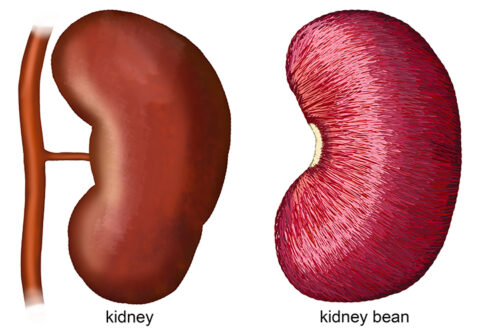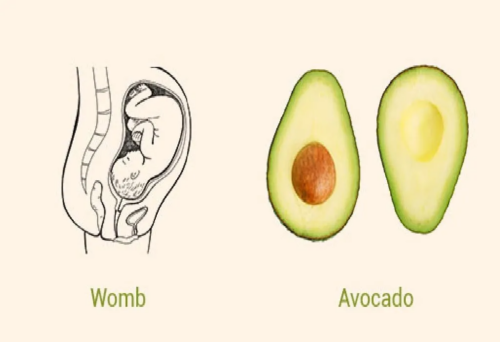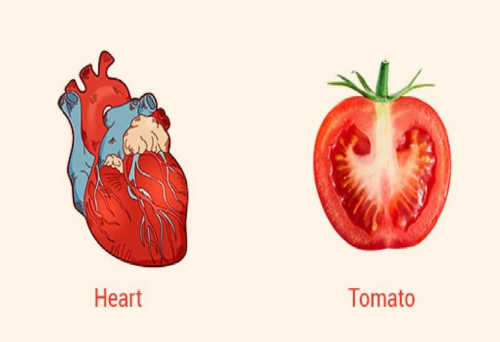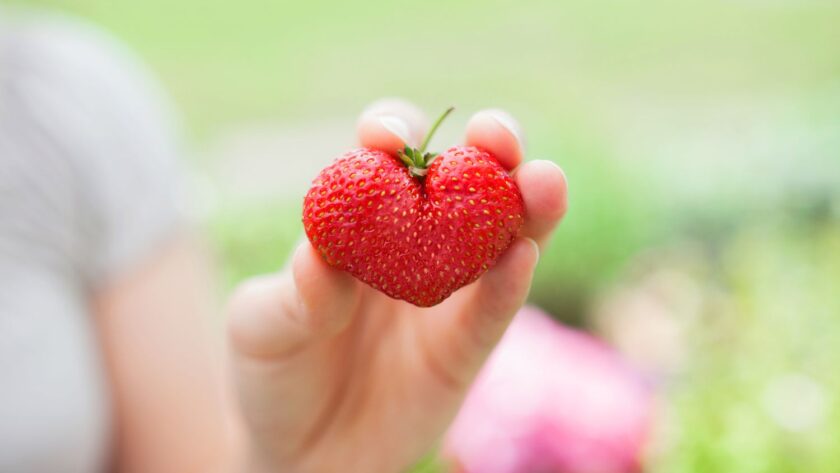From the iconic heart-shaped strawberry to the elongated, curvy banana, and even the peculiarly familiar shape of the walnut brain, the world of fruits and vegetables is seemingly riddled with symbolic connections to the human body. Could this phenomenon be more than just a visual coincidence? Could nature be subtly hinting at the health benefits these foods offer for specific organs or systems?
In this article, we will embark on a fascinating journey through the world of botanical resemblances, exploring the intriguing link between fruits, vegetables, and the body parts they are thought to support. Unraveling this fascinating mystery may offer us new perspectives on nutrition, traditional beliefs, and the profound connections that exist between us and the natural world. So, let’s dive in and discover the hidden stories behind these edible wonders and their remarkable affinity for human anatomy.

- Strawberries And Teeth: Did you know that strawberries not only resemble the human heart but also our teeth? Slice one open, and you’ll notice the tiny seeds bear an uncanny likeness to tooth enamel structures. Beyond their appearance, strawberries offer oral health benefits too.Rich in vitamin C, strawberries promote gum health by supporting collagen synthesis, keeping gums firm and strong. Moreover, they contain malic acid, a natural enamel whitener that helps remove surface stains from teeth, restoring their shine.
Low in sugar compared to many fruits, strawberries make a tooth-friendly choice, satisfying sweet cravings while minimizing the risk of cavities. Incorporate strawberries into your daily routine for a delicious and nutritious way to support your oral health. Remember, they complement proper dental care, including regular brushing, flossing, and dental check-ups, to maintain a bright and healthy smile.
Check Out This Organic Strawberry Powder For A Healthy Smile!

- The Visionary Carrot: Carrots, with their bright orange hue and elongated shape, bear an uncanny resemblance to the human eye. It is no secret that carrots are an excellent source of beta-carotene, a precursor to vitamin A, which is essential for maintaining good vision. Vitamin A plays a vital role in eye health and can help prevent conditions like night blindness and age-related macular degeneration. In addition to beta-carotene, carrots contain antioxidants such as lutein and zeaxanthin, which further promote eye health and protect the eyes from harmful UV rays. Whether you enjoy them raw as a crunchy snack or cooked in soups and stews, carrots offer a simple and delicious way to support your vision.

- The Brain-Boosting Walnut: Crack open a walnut, and you’ll discover a striking resemblance to the human brain’s two hemispheres. These nutty powerhouses are packed with omega-3 fatty acids, antioxidants, and vitamin E, making them an excellent choice for supporting brain health. Omega-3 fatty acids, in particular, have been linked to improved cognitive function and memory, while antioxidants help protect brain cells from oxidative stress. Moreover, walnuts are known to reduce inflammation, which plays a crucial role in various brain-related disorders. Snacking on walnuts or adding them to salads, oatmeal, or baked goods can give your brain a healthy boost and nourish your mind from within.

- The Nourishing Kidney Bean: Named after their kidney-like shape, kidney beans are a rich source of fiber, protein, vitamins, and minerals. As a key player in supporting digestive health, their high fiber content aids in regular bowel movements and helps keep the digestive system functioning optimally. Additionally, kidney beans are a valuable plant-based protein source, essential for muscle building, repair, and overall body functions. These beans are also abundant in folate and iron, which are vital for maintaining healthy blood and preventing anemia. Incorporating kidney beans into your diet through soups, stews, salads, or bean burgers can provide your body with a dose of nourishment and support your digestive and circulatory systems.

- The Bone-Building Celery: Celery’s long, slender stalks bear a resemblance to bones, and interestingly, this vegetable is a rich source of calcium, which is essential for maintaining strong bones. Additionally, celery contains vitamin K, which helps improve bone density and plays a role in blood clotting. This crunchy vegetable is also low in calories and high in fiber, making it an excellent choice for weight management and supporting a healthy digestive system. The high water content in celery promotes hydration, which is crucial for overall well-being. Incorporate celery into your diet as a snack with hummus, add it to soups and salads, or juice it for a refreshing and hydrating beverage.
Check Out This Organic Celery Juice Powder For Strong Bones!
- Ginger and the Stomach: With its knobby, gnarled appearance, ginger closely resembles the human stomach. Not only is ginger a popular remedy for nausea and indigestion, but it also possesses anti-inflammatory properties that can help soothe an upset stomach. Ginger has been used for centuries as a traditional medicine to alleviate various digestive discomforts, including bloating, gas, and indigestion. Additionally, ginger contains bioactive compounds, such as gingerol, that may contribute to its anti-inflammatory and antioxidant effects. Incorporating fresh ginger into your diet, whether in teas, soups, stir-fries, or smoothies, can aid in digestion and promote overall gastrointestinal health.Check Out This Organic Ginger Powder For An Immunity Boost!

- The Hormonal Avocado: Avocados are often associated with fertility and reproductive health due to their resemblance to the female uterus. Rich in healthy fats, potassium, and vitamin E, avocados are beneficial for hormonal balance and overall reproductive health. Monounsaturated fats found in avocados support hormone production and cellular health, while potassium aids in regulating blood pressure and nerve function. Avocados are also an excellent source of folate, a crucial nutrient for pregnant women to support the healthy development of the fetus. Whether spread on toast, blended into smoothies, or used as a creamy salad dressing, avocados can be a delicious addition to your diet to support reproductive health.

- The Radiant Tomato: Slice a tomato horizontally, and its chambers will remind you of the structure of the human heart. Rich in lycopene, an antioxidant with numerous health benefits, tomatoes are known to support heart health and may help reduce the risk of heart-related ailments. Lycopene has been associated with lower levels of LDL cholesterol and blood pressure, making it beneficial for cardiovascular health. Additionally, tomatoes are packed with vitamins A, C, and K, as well as potassium and fiber, making them a versatile and nutritious addition to various dishes. Whether used in sauces, salads, or simply eaten fresh, tomatoes offer a delightful way to take care of your heart while relishing their vibrant flavor.

- The Cancer Protector Broccoli: Broccoli’s resemblance to cancer cells goes beyond looks, as this cruciferous vegetable possesses powerful cancer-fighting properties. Rich in sulforaphane, broccoli targets and inhibits cancer growth by boosting antioxidant defenses and eliminating potentially harmful cells. Regular consumption may protect against various cancers, making broccoli a valuable addition to a health-conscious diet. Enjoy it steamed, roasted, or in salads for a delicious and nutritious boost. Remember, a balanced lifestyle remains key to cancer prevention, with broccoli playing a part in nature’s fight against this devastating disease.
Add This Organic Broccoli Powder To All Your Soups And Smoothies!
- The Harmonizing Citrus: Cut a citrus fruit in half, and you’ll notice the resemblance to female mammary glands. Lemons, oranges, grapefruits and limes are rich in vitamin C and have natural antibacterial properties, which can help maintain breast health. Vitamin C is a powerful antioxidant that plays a crucial role in protecting the body from free radicals, which can cause cell damage. This antioxidant power contributes to overall health and may be particularly beneficial for breast tissue. Additionally, lemons have a refreshing, zesty flavor that can enhance the taste of numerous dishes and beverages. Squeeze lemon juice over salads, mix it into your water, or use it as a flavor enhancer in various recipes to harness its breast-supportive benefits.
Add This Bright Organic Lemon Powder To All Your Favorite Drinks!
While these resemblances may be a delightful quirk of nature, it is essential to remember that the health benefits of fruits and vegetables extend beyond their visual similarities. Consuming a diverse array of fresh produce is key to obtaining a wide range of nutrients, vitamins, and minerals that support overall health and well-being.
Embracing the bounty that nature offers allows us to connect more deeply with the world around us while nurturing our bodies with wholesome, nourishing foods. So, the next time you indulge in a heart-shaped strawberry or bite into a carrot for better vision, take a moment to appreciate the remarkable symphony of nature’s design and its connection to our well-being.
Let us celebrate the beauty and wisdom of nature’s edible wonders and revel in the profound relationship between us and the bounty of the Earth.




